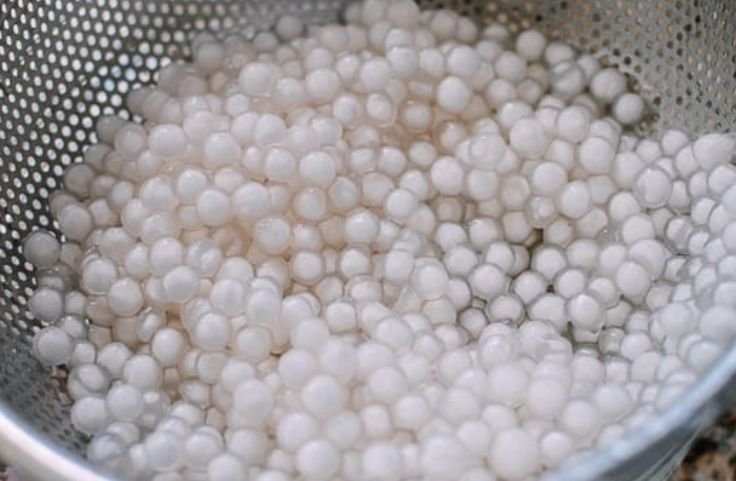Instant tapioca pearls are a culinary innovation that has gained popularity, particularly among enthusiasts of desserts and beverages.
Instant tapioca pearls make it easy to enjoy bubble tea, puddings, and other sweet treats without long cooking times.
They deliver the same chewy texture you crave but cook much faster, fitting perfectly into modern, fast-paced lifestyles.
Designed for convenience, they shorten preparation while keeping the quality and flavor intact.
These pearls are a time-saver for home cooks, dessert lovers, and café owners who want quick results without compromise.
Whether used in drinks or creative recipes, they add that satisfying bite with minimal effort.
Their quick-cooking nature has made them a staple ingredient in bubble tea shops and kitchens worldwide, offering the perfect balance between texture, taste, and convenience.
Recommended: Ultimate Guide to Tapioca
What is Instant Tapioca Pearls?
Instant tapioca pearls, different from instant tapioca, are precooked, dehydrated spheres made from cassava starch that soften into a chewy texture within minutes of boiling.
Unlike instant tapioca, which comes in granulated form for thickening desserts or sauces, these pearls are crafted for bubble tea, puddings, and sweet recipes that call for a smooth, bouncy bite without lengthy cooking.
Recommended: Step-By-Step Guide to Make Tapioca Pearls
Instant Tapioca Pearls Ingredients
Instant tapioca pearls are made using simple ingredients that come together to create their chewy and enjoyable texture.
Each ingredient plays a role in ensuring quick cooking, flavor absorption, and consistency in every bite.
Cassava Starch
Starch from cassava or tapioca forms the foundation of instant tapioca pearls.
It comes from the cassava root and provides the chewy, elastic texture that makes tapioca pearls enjoyable.
This starch is refined to remove fibers and impurities, leaving behind the smooth base that shapes into uniform spheres during production.
Water: The Binding Element
Water helps turn cassava starch into a pliable dough that can be rolled into small, even pearls.
It also supports gelatinization during cooking, giving the pearls their springy texture.
The right balance of water ensures the pearls hold their shape while remaining tender once cooked.
Sweeteners: Flavor and Texture Support
Some instant tapioca pearls contain added sweeteners such as sugar or glucose syrup.
These ingredients add mild sweetness and help the pearls retain moisture after drying.
Sweetened pearls are commonly used in desserts and bubble tea to enhance flavor and maintain chewiness even after cooling.
Coloring Agents: Visual Appeal
Coloring agents are sometimes added to give tapioca pearls their distinct look, ranging from classic white to brown or black varieties.
Natural colors from caramel or fruit extracts are common choices.
These additions make the pearls visually attractive, especially in beverages and dessert presentations.
Related Posts
What to Know about Small Tapioca Pearls
How Gluten-Free Are Tapioca Pearls?
Tasty Tapioca Pearls Recipes to Try
Types and Sizes of Tapioca Pearls
The Most Appropriate Tapioca Pearls for Making Pudding
How Instant Tapioca Pearls Are Made
Instant tapioca pearls are created through a detailed process that transforms cassava root into the chewy spheres you enjoy in bubble tea and desserts.
Each step ensures texture, flavor, and long shelf life.
Starch Extraction
Production begins with cassava roots that are washed, peeled, and grated.
The grated cassava is mixed with water to release starch, which separates from the fibrous material.
The collected starch is then refined into a smooth paste that becomes the base for forming the pearls.
This step determines the quality and consistency of the final product.
Dough Formation
The refined starch is kneaded into a dough and shaped into small, uniform balls.
The dough’s thickness and texture affect how the pearls cook and absorb flavor later.
Consistency during this stage ensures even cooking and a chewy, pleasant mouthfeel when rehydrated.
Pre-Cooking
Before drying, the pearls are briefly steamed or boiled.
This partial cooking process locks in their round shape and creates the chewy bite that instant tapioca is known for.
It also reduces overall cooking time later, making preparation quick and convenient.
Dehydration
Once pre-cooked, the pearls are dried using hot air or vacuum methods to remove moisture.
This step preserves freshness and prevents spoilage, allowing them to be stored for months.
Proper dehydration also ensures they quickly rehydrate when boiled, maintaining their signature soft yet springy texture.
Packaging
After drying, the pearls are sorted and packaged for distribution. Each batch is sealed to protect against humidity and contamination.
When you cook them, they rehydrate within minutes, turning into glossy, chewy pearls ready for your favorite bubble tea, pudding, or dessert recipes.
Cooking Instant Tapioca Pearls
Cooking instant tapioca pearls is quick and rewarding once you understand the right steps.
You don’t need soaking or special tools, just water, attention, and a bit of timing.
Measure and Prepare the Pearls
Start by deciding how much you want to make. Use the right ratio: one cup of tapioca pearls to seven cups of water.
This allows enough space for the pearls to move freely while cooking.
Bring the water to a boil before adding the pearls, so they don’t turn mushy or clump together.
Boil and Stir the Pearls
Add the pearls gently into the boiling water and stir right away.
Keep the water bubbling and cook for about five to ten minutes.
The pearls will start turning translucent, leaving a small white core. This visual cue helps you know they’re almost ready.
Test for Doneness
To avoid gummy pearls, taste one before the timer ends. If it’s chewy but soft at the center, it’s done.
Remove the pot from the heat immediately.
Overcooking can ruin the texture and make the pearls too sticky for your recipe.
Drain and Rinse Properly
Pour the cooked pearls into a fine-mesh strainer and rinse under cold water.
This stops the cooking process and removes excess starch.
It also keeps the pearls from sticking together, leaving them smooth and shiny.
Keep the Pearls Fresh
If you’re not serving them right away, toss the drained pearls with a little neutral oil.
This simple trick prevents clumping and keeps their chewy texture intact until you add them to drinks or desserts.
Instant Tapioca Pearls vs Regular Tapioca Pearls
Choosing between instant tapioca pearls and regular tapioca pearls depends on your time, taste, and texture preference.
Each type brings a different cooking experience and result to your desserts and drinks.
Cooking Time
Instant tapioca pearls are made for speed. They cook in just five to ten minutes and don’t need soaking, making them perfect when you want something fast.
Regular tapioca pearls, however, demand patience.
They can take up to an hour to fully soften, which works better when you have time to enjoy the process.
Texture
Instant tapioca pearls turn soft and slightly gelatinous after cooking, giving a smooth texture that blends easily into puddings and milk teas.
Regular tapioca pearls, on the other hand, have a firmer chew that many bubble tea lovers prefer.
Their dense, bouncy bite adds a satisfying mouthfeel to desserts and drinks.
Taste
Both types share a mild, neutral taste, but regular tapioca pearls can absorb flavors more deeply due to their long cooking time.
This makes them ideal if you like your pearls to carry the sweetness or aroma of the syrup or tea they’re cooked in.
Instant pearls deliver a lighter flavor that pairs well with quick recipes.
Shelf Life
Instant tapioca pearls have better shelf stability since they’re precooked and dehydrated.
You can store them for a long time without losing quality.
Regular tapioca pearls need more careful storage because they can absorb moisture easily and spoil faster.
This makes instant pearls a convenient choice for everyday use.
What Are Instant Tapioca Pearls Used for?
Instant tapioca pearls are more than a quick ingredient. Their chewy texture and mild flavor make them perfect for a range of sweet and refreshing recipes you can easily prepare at home.
Bubble Tea
You can’t think of tapioca pearls without bubble tea. These pearls bring that satisfying chew to your favorite drink.
Brew your preferred tea, sweeten it, add milk or a dairy alternative, then mix in cooked instant tapioca pearls.
The contrast between the creamy drink and the chewy pearls makes every sip enjoyable.
Tapioca Pudding
Instant tapioca pearls make homemade pudding easy.
Boil them with milk, sugar, and a pinch of salt for a creamy dessert in minutes.
You can flavor your pudding with vanilla, chocolate, or fruit to create something comforting and satisfying after a meal or as a mid-day treat.
Traditional Asian Desserts
Instant tapioca pearls fit beautifully into classic Asian desserts. In dishes like tong sui, they bring a soft, chewy texture to sweet coconut milk soups.
Simmer the pearls in a sugary broth until tender.
The result is a warm, soothing dessert you can enjoy with family or friends.
Frozen Treats and Parfaits
For something refreshing, add instant tapioca pearls to frozen desserts or parfaits.
They pair well with yogurt, fruit, or flavored syrups, giving each layer a pleasant texture.
Their smooth appearance also makes your dessert visually appealing, turning a simple treat into something special.
Storage and Reheating Tips
Proper storage and reheating keep instant tapioca pearls fresh and chewy.
Unopened packages should be stored in a cool, dry place away from sunlight and moisture to prevent clumping.
Once opened, transfer them to an airtight container to maintain texture and extend shelf life, which can last up to a year if stored well.
Cooked pearls are best enjoyed fresh, but leftovers can be refrigerated for up to four days in a sealed container.
When reheating, restore their moisture and chewiness by simmering them gently in warm water or microwaving with a little water in short bursts.
Stir occasionally to avoid sticking or overcooking. These simple practices help preserve the pearls’ flavor and consistency, ensuring they remain delicious in bubble tea, puddings, or desserts even after storage.
Conclusion
Instant tapioca pearls have transformed how you prepare desserts and drinks, saving you time while keeping that familiar chewy texture intact.
Their convenience makes them perfect for busy lifestyles, allowing you to create bubble tea, puddings, and other treats in minutes.
With a quick cooking process and a long shelf life, they’re an ideal ingredient for both home kitchens and cafés.
Beyond their ease of use, they adapt beautifully to different recipes, from creamy desserts to chilled drinks.
Their neutral taste lets them absorb flavors effortlessly, giving every bite a satisfying balance of sweetness and chewiness.
If you enjoy experimenting with fun textures and flavors, instant tapioca pearls are your go-to choice for simple yet delightful homemade creations.
Frequently Asked Questions
What is the difference between instant and regular tapioca pearls?
Instant tapioca pearls are precooked and dehydrated, cooking in minutes. Regular tapioca pearls are raw and require longer boiling, typically 30 to 60 minutes, to achieve chewiness.
How long do cooked instant tapioca pearls last?
Cooked instant tapioca pearls stay fresh for about three to four days when stored in a sealed container in the refrigerator. They taste best when freshly made.
Can I reheat instant tapioca pearls?
Yes, you can reheat them by simmering in warm water or microwaving with a bit of water to restore their soft, chewy texture.
Are instant tapioca pearls gluten-free?
Yes, instant tapioca pearls are naturally gluten-free since they’re made from cassava starch, making them a suitable option for people with gluten sensitivities.

Chimeremeze Emeh is a writer and researcher passionate about Africa’s most transformative root crop—cassava. Through his work at cassavavaluechain.com, he explores the entire cassava industry, from cultivation and processing to its diverse applications in food, health, and industrial use.
He also writes for palmoilpalm.com, where he shares his extensive experience and deep-rooted knowledge of palm oil, covering red palm oil, palm kernel oil, and refined products. His work there reflects his lifelong connection to agriculture and his commitment to promoting sustainable value chains in Africa.
Driven by curiosity and purpose, Chimeremeze aims to shed light on how cassava continues to empower communities, strengthen food systems, and link traditional farming wisdom with modern innovation.

